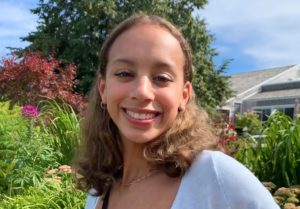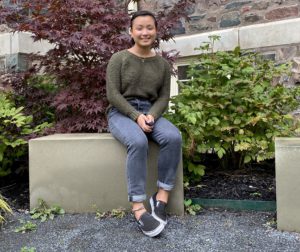Sophia Wedderburn said she was “intrigued” and “captivated” when she heard about the King’s Foundation Year Program (FYP). “The sense of community at King’s really enticed me, and I find that very important,” she said.

Sophia Wedderburn
A Prince Scholarship recipient, the first-year student, who grew up in Halifax, admits she was “definitely disappointed” and a bit skeptical when she learned classes were going to be all online this year. But those concerns turned out to be unfounded.
“I’ve felt really welcomed by the community and FYP family,” she said. “I’ve felt really supported by my tutor, and the administration and my fellow classmates.”
For Lokman Wong, FYP presented an opportunity to expand her horizons and spend time in another part of the country. Born in Hong Kong and raised in Campbell River, BC, Wong visited Nova Scotia to go to Air Cadets glider-pilot school at 16, and was keen to return.
FYP lectures are asynchronous—meaning students can follow them on their own schedule—with synchronous tutorials.
Wong said the tutorials allow students to “feel like we still have that formal class structure where you go to the tutorial… We have to show up and we have to talk about the ideas.”
As a student in residence, Wong said she is also grateful that she has “the opportunity to connect with other people and talk about our ideas, and essays, and brainstorm together.” Students have restrictions on movement of course. Wong said, “You can’t just pack the whole of Alex Hall residence into the common rooms.” But she is impressed by the efforts of staff to foster community through events like movie nights.
Even if there is not a lot of socializing on campus, Wedderburn said the university has successfully used virtual events as a way to bring students together. She pointed to two in particular: Read Now and Write Now.
Read Now involves tutors doing live readings of works that will be covered the next day. “I mean, one Read Now had an aria in it from an opera, which was really exciting,” she said.
Write Now is an opportunity for students to connect online and work on essays at the same time. “Everyone can tune in, you can chat, and it gives you that feeling of being in a room or in a library full of people who are all going through the same thing as you are, working on your paper. It definitely makes the experience a lot less isolating,” she said. “I personally did not realize how fundamentally helpful it is to just be surrounded by people that are working on something. Being able to do that to some extent virtually has really enhanced my experience.”

Lokman Wong
In a time of turmoil, FYP offers some much-needed stability and perspective. “I think doing FYP in this time, while different and challenging, is something stable that you can count on,” Wong said. “No matter how the rest of the world changes … it’s really nice to have this program and be able to look to the past and draw from past experiences… I think that in order to really get the most out of the program you have to be open to being challenged, open to challenging your professors about what they’re saying about the text, and open to reading the text as it is.”
And that will always be true, whether students are engaging with their FYP texts in person or online.
As Wedderburn said, “It’s been an unusual time, but I’ve been very pleasantly surprised by how it hasn’t been negatively unusual.”
To find out more, visit the Foundation Year Program page.

